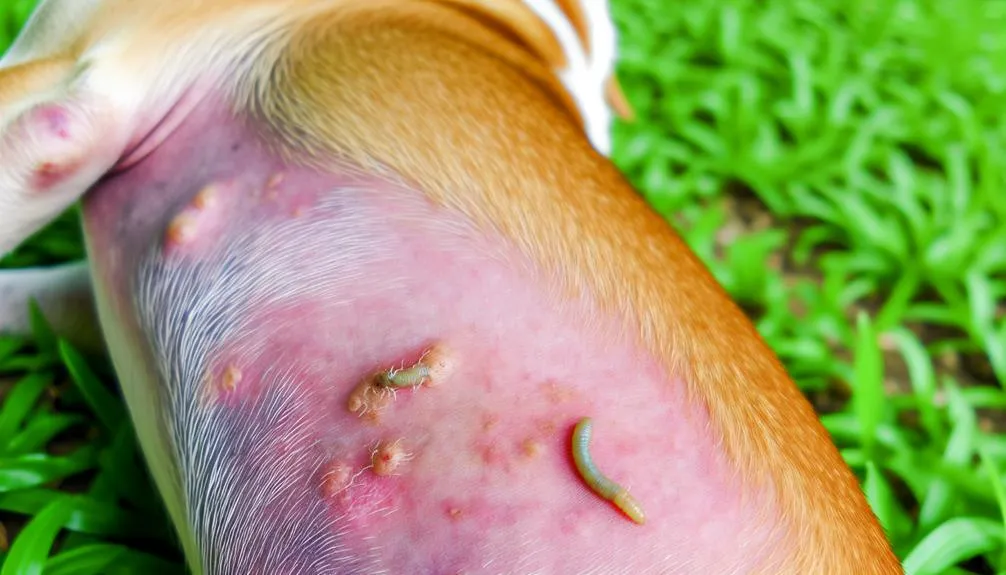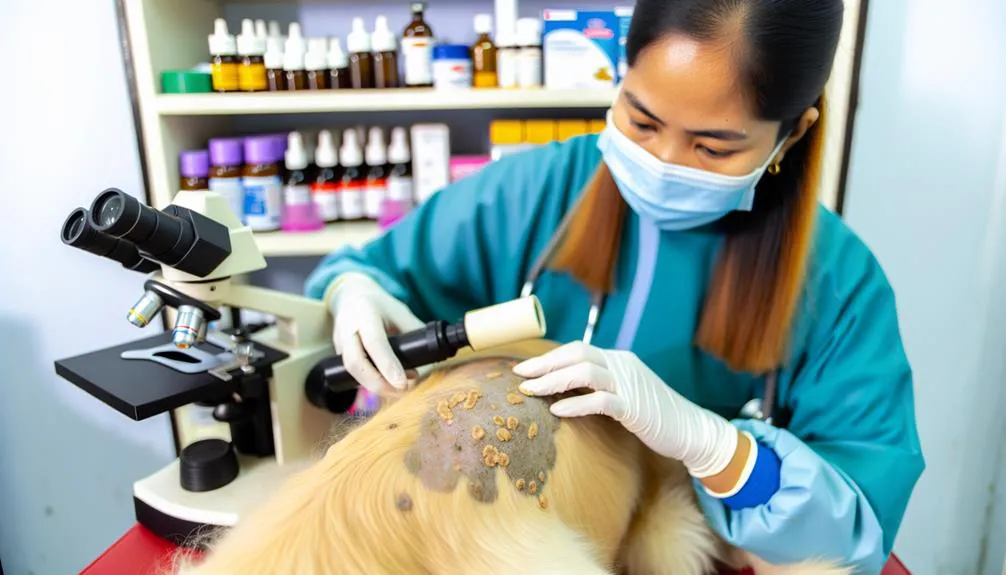
Do Worms Cause Dog to Itch
If you've noticed your dog scratching more than usual, you might be wondering if worms could be the culprit. While many pet owners associate itchiness with common allergens or skin issues, the presence of worms can also trigger an immune response that leads to skin irritation. This begs the question: how exactly do these parasites affect your dog's skin health? Understanding the connection might be essential for your pet's well-being, and there are several factors to take into account before jumping to conclusions. Let's explore these aspects further.
Understanding Worm Infestations
Worm infestations in dogs can be a hidden menace, often going unnoticed until symptoms become severe. Understanding the worm life cycle is vital for preventing and addressing these infestations. Worms, such as roundworms, hookworms, and tapeworms, follow specific life cycles that involve multiple stages, including eggs, larvae, and adult forms. Each type of worm has its own unique life cycle, which can affect how they infest your dog.
Infestation types vary based on the worm species and the mode of transmission. For instance, roundworm infestations typically occur when dogs ingest contaminated soil or feces containing eggs. Conversely, hookworms can enter through the skin, making outdoor exposure a risk factor. Tapeworms often hitch a ride in fleas, so if your dog has a flea problem, it could lead to a tapeworm infestation.
Being aware of these life cycles and infestation types helps you recognize potential risks and take preventive measures. Regular veterinary check-ups, proper sanitation, and effective flea control can reduce the chances of your dog contracting worms. It's important to monitor your pet's environment and lifestyle for potential exposure to these parasites. Understanding how worms invade and thrive in your dog will empower you to act proactively, ensuring a healthier, happier life for your furry companion. Remember, early detection and intervention can minimize the impact of infestations, keeping your dog safe from these hidden threats.
Common Symptoms of Worms
When evaluating your dog for potential worm infestations, it's essential to recognize common symptoms. You might notice skin irritation signs, digestive disturbances indicators, and behavioral changes that warrant attention. Identifying these symptoms early can help in seeking appropriate veterinary care.
Skin Irritation Signs
Many dog owners may not realize that skin irritation can be a common symptom of worm infestations. When your dog experiences itching or scratching, it's important to evaluate the potential causes, including worms. While allergies, flea infestations, and skin infections are often the first culprits that come to mind, worms can also contribute to these symptoms.
If your dog has a worm infestation, it may develop skin irritation due to the immune response triggered by the parasites. This can lead to allergy reactions, where your dog's body reacts to the presence of worms, causing inflammation and discomfort. Additionally, dietary issues and environmental factors can exacerbate these skin problems, complicating the diagnosis.
It's essential to observe your dog's behavior and physical condition closely. Look for signs like redness, swelling, or unusual scratching patterns. If these symptoms persist, consulting a veterinarian is critical for a thorough examination. They can determine whether worms or another underlying issue is causing your dog's skin irritation. Early detection and treatment can prevent further complications and help restore your dog's comfort.
Digestive Disturbances Indicators
Skin irritation isn't the only indicator of potential worm infestations in dogs; digestive disturbances often accompany these parasites as well. If your dog's digestive health is compromised, you might notice several symptoms that signal the presence of worms. These can include diarrhea, vomiting, weight loss despite a good appetite, and bloating. Each of these signs can also indicate nutritional deficiencies, as worms can interfere with nutrient absorption.
Here's a quick reference table outlining common digestive disturbances associated with worm infestations:
| Symptom | Description | Potential Impact |
|---|---|---|
| Diarrhea | Frequent loose stools | Dehydration, weight loss |
| Vomiting | Recurrent or sudden vomiting | Nutritional deficiencies |
| Weight Loss | Noticeable decrease in body weight | Weakness, lethargy |
| Bloating | Distended abdomen | Discomfort, pain |
If you observe any of these signs, it is crucial to consult your veterinarian. Identifying and treating the underlying cause will help restore your dog's digestive health and overall well-being, preventing further complications from nutritional deficiencies.
Behavioral Changes Observations
A variety of behavioral changes can signal the presence of worms in dogs, warranting careful observation. You might notice increased restlessness or excessive scratching, which can indicate discomfort. Dogs may also exhibit lethargy, showing less interest in play or walks. Changes in appetite—either increased or decreased—are common behavioral changes to be aware of.
Utilizing effective observation techniques is essential for early detection. Keep an eye on your dog's grooming habits; excessive licking or biting at their skin can suggest irritation often associated with worm infestations. Monitor their interactions with other pets and people; withdrawal or aggression can also be behavioral indicators.
Additionally, watch for signs of anxiety, such as pacing or whining. These changes can stem from the discomfort caused by worms. It's important to document any observed changes in behavior and discuss them with your veterinarian, as these observations can greatly aid in diagnosis and treatment. Recognizing these behavioral changes early on can lead to timely intervention, ensuring your dog receives the care they need to alleviate any discomfort caused by worms.
How Worms Affect Skin Health

Worms can greatly impact your dog's skin health through various irritation mechanisms. When these parasites invade, they can trigger an immune response that leads to inflammation and discomfort. Understanding these processes is essential for managing your pet's skin issues effectively.
Skin Irritation Mechanisms
In recent years, the impact of parasitic infections on overall skin health has garnered increasing attention. Worms can compromise your dog's skin barrier, leading to various irritation mechanisms. When the skin barrier is disrupted, it can trigger an itch cycle that exacerbates discomfort.
Consider the following points regarding how worms affect skin health:
- Direct irritation: Parasitic infestations may release toxins that irritate the skin directly.
- Nutritional deficiencies: Worms can sap essential nutrients from your dog, reducing skin health and resilience.
- Inflammatory responses: The presence of worms can initiate local inflammatory responses, further aggravating skin conditions.
- Secondary infections: Scratching due to itching can result in skin lesions, making your dog vulnerable to secondary bacterial or fungal infections.
These mechanisms highlight the significance of maintaining a healthy skin barrier. When worms interfere with this barrier, your dog experiences the itch cycle, making it important to monitor and address any signs of infection or infestation promptly. Understanding these skin irritation mechanisms enables you to take informed steps in managing your dog's skin health effectively.
Immune Response Factors
When dealing with skin health, understanding the immune response to parasitic infections is essential. Worms can trigger various reactions in your dog's immune system, leading to skin issues, including itching. The immune system recognizes these parasites as threats, initiating an inflammatory response that can exacerbate skin irritation.
Here's a concise overview of how worm infections affect skin health:
| Immune Response Factor | Effect on Skin Health |
|---|---|
| Cytokine Release | Promotes inflammation |
| Eosinophil Activation | Causes allergic reactions |
| Antibody Production | May lead to hypersensitivity |
| Skin Barrier Disruption | Increases vulnerability to infections |
Allergic reactions may manifest as itching, redness, or lesions, making your dog uncomfortable. This response can sometimes be disproportionate to the actual threat posed by the worms. Understanding these factors can help you better manage your dog's skin health and consult with your veterinarian regarding appropriate treatments. Early intervention is critical to mitigate the effects of these immune responses and restore your dog's skin integrity.
Other Causes of Itchiness
Identifying the various causes of itchiness in dogs can be a complex process, as numerous factors may contribute to the discomfort. While worms might cross your mind, it's essential to look at other potential culprits. Various conditions may lead to your dog experiencing intense itching, necessitating a thorough allergies analysis to pinpoint the root cause.
Consider these common factors:
- Flea infestations: Fleas are notorious for causing severe itching. Even one flea can trigger a significant reaction in some dogs, leading to relentless scratching.
- Environmental allergies: Dogs can develop sensitivities to pollen, mold, or dust mites, resulting in itchy, inflamed skin.
- Food allergies: Certain ingredients in dog food can provoke allergic reactions, leading to skin irritation and itchiness.
- Infections: Bacterial or fungal infections can also lead to itching. These infections often occur secondary to other skin problems, exacerbating the discomfort.
Diagnosis and Treatment Options

Determining the cause of your dog's itching is just the first step; effective diagnosis and Treatment options are vital for relief. If worms are suspected as a culprit, a veterinary consultation is imperative. Your veterinarian will conduct a detailed examination, which may include fecal tests to identify the presence of parasites. If worms are confirmed, appropriate deworming protocols will be initiated based on the type of worm and your dog's specific needs.
Here's a quick overview of potential diagnosis and Treatment options:
| Diagnosis Method | Treatment options |
|---|---|
| Fecal Exam | Deworming Medications |
| Skin Scrapings | Antihistamines |
| Allergy Testing | Topical Treatments |
| Blood Tests | Dietary Changes |
Once the diagnosis is established, your vet will recommend a tailored treatment plan. Deworming medications are typically effective and can eliminate the parasites responsible for your dog's discomfort. In addition to deworming, other treatments may be suggested to alleviate itching, such as antihistamines or topical treatments to soothe the skin.
It's important to follow your veterinarian's guidance closely. Regular follow-ups might be necessary to verify the treatment's efficacy and monitor for any potential re-infestation. By addressing the issue promptly and following a thorough plan, you can help restore your dog's comfort and wellbeing.
Preventive Measures for Dogs
Preventive measures are crucial for maintaining your dog's health and minimizing the risk of itching caused by worms and other parasites. By taking proactive steps, you can help guarantee your dog remains comfortable and healthy. Here are some effective strategies you should consider:
- Regular veterinary check-ups: Schedule routine visits to your veterinarian for thorough health assessments and deworming treatments.
- Consistent grooming routines: Maintain a regular grooming schedule to remove dirt, debris, and potential parasites from your dog's coat. This also allows for early detection of any skin issues.
- Dietary supplements: Incorporate dietary supplements specifically designed to bolster your dog's immune system and promote healthy skin. Omega-3 fatty acids and probiotics can be particularly beneficial.
- Clean living environment: Keep your home and yard clean to minimize exposure to parasites. Regularly dispose of waste and maintain a tidy area where your dog plays.
Implementing these preventive measures can notably reduce the risk of itching and discomfort in your dog. It's important to remain vigilant and attentive to any changes in your dog's behavior or skin condition. If you notice excessive scratching, redness, or other signs of irritation, consult your veterinarian promptly. By prioritizing preventive care, you're investing in your dog's long-term health and well-being, making sure they lead a happy and active life free from the discomfort of parasites.
Frequently Asked Questions
Can Dogs Get Worms From Eating Grass?
Yes, dogs can get worms from grass consumption, especially if the grass is contaminated with eggs or larvae. Watch for Worm symptoms like vomiting, diarrhea, or weight loss, and consult your vet if noticed.
Are Certain Dog Breeds More Prone to Worms?
Certain breeds, like Retrievers, show higher worm susceptibility, with studies revealing up to 30% prevalence. Worm symptoms vary, and understanding transmission methods can aid in preventive measures to protect your dog's health effectively.
Do Worms Affect Dog Behavior or Mood?
Worms can lead to noticeable behavioral changes in dogs, as symptoms like lethargy or discomfort may arise. If you observe such changes, it's essential to consult a veterinarian for appropriate diagnosis and treatment.
Can I Prevent Worms With a Special Diet?
When it comes to worm prevention, you can't put all your eggs in one basket. A special diet alone won't suffice; consider incorporating dietary supplements alongside regular vet check-ups to effectively keep worms at bay.
How Often Should I Check My Dog for Worms?
You should check your dog for worms at least every three months. Look for Worm symptoms like weight loss or lethargy. Regular vet visits and prevention tips can help maintain your dog's health and well-being.
Conclusion
To sum up, while worms can be a significant source of discomfort for your dog, causing itching and skin irritation, they aren't the only culprits. Think of it as a garden: if weeds (worms) invade, they can choke out healthy plants (skin). By recognizing symptoms early and seeking veterinary care, you can restore your pet's well-being and prevent future infestations. Remember, a healthy dog is like a well-tended garden, flourishing and free from distress.
You may also like
Archives
Calendar
| M | T | W | T | F | S | S |
|---|---|---|---|---|---|---|
| 1 | 2 | 3 | 4 | 5 | 6 | |
| 7 | 8 | 9 | 10 | 11 | 12 | 13 |
| 14 | 15 | 16 | 17 | 18 | 19 | 20 |
| 21 | 22 | 23 | 24 | 25 | 26 | 27 |
| 28 | 29 | 30 | ||||
Leave a Reply